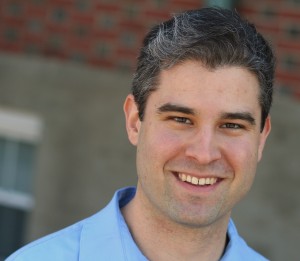Michael Horn: Why Edu Innovation Isn’t About Tech Taking Over Teaching
By Wired Academic on May 22, 2013
Blended Learning, Domestic, Education Quality, Ethics, K-12, Opinion, Personalized Learning, Required, Teachers, Technology, Venture Capital

By Michael Horn, Columnist
A few weeks back, I had the honor to emcee the closing awards dinner at the Education Innovation Summit in Scottsdale. The evening took a sour note though as the dinner keynote, which Andy Kessler delivered, stunned and offended the majority of the audience by essentially arguing that as digital learning rises, we won’t need teachers anymore.
The audience took to Twitter to voice vehement disagreement, and my co-emcee and I — we were just as surprised as everyone else — did our best to distance ourselves from the remarks and hit the reset button on the evening.
To be clear, inviting controversial and provocative comments with which one may disagree is entirely appropriate at an education conference. Open debate and free speech are important. In my opinion though, they belong in the context of the conference—in which people have the opportunity to debate them—not at a closing awards dinner meant to cap a once-again successful and high-spirited conference on innovation in education. For an education technology sector struggling to fight the erroneous claim by some that it’s “tech or teachers,” choosing Kessler to deliver the closing keynote at a feel-good awards dinner was tone deaf and felt like an endorsement of his message, not a speech meant to provoke debate and discussion.
What’s clear to many of us who work in the edtech field is that we need to replace the word “or” with the word “and.” As former West Virginia Gov. Bob Wise often says, “Digital learning erases the line between high tech or high teach.”
With that all said, Kessler’s keynote got me thinking. He made some points with which the edtech sector—and the field of education more generally—should grapple and not simply sweep under the rug.
Kessler argued that whenever a truly transformational disruptive innovation has come along, it hasn’t just wiped out a whole set of businesses, it wipes out a whole sector of jobs. One example he gave was switchboard operators. When computerized dialing systems were introduced, they replaced the need for manual telephone switchboards and, consequently, the switchboard operators that ran them.
But what was unfortunate was the part of the story Kessler left out of his talk. Even as the shift to computerized dialing systems famously wiped out the jobs of switchboard operators, it created enormous job growth in new types of jobs that often involved more skill and paid better. There were of course the direct jobs—the people who built the switches and the switching systems and those who designed, integrated, and managed the software. But the new, better phone system also enabled new applications—ranging from simple touch-tone ordering systems to, ultimately, the Internet—which supported an entirely new set of commercial opportunities and jobs.
The omission is a big mistake because although the analogy is imperfect, there are parallels to education. As blended learning grows in K–12 education, it is not eliminating teachers, but eliminating certain traditional job functions of teachers. This change in the role of the teacher is, as others and I have noted, in part about allowing computers to do what computers do well to free up teachers to do what only humans can do.
Teachers—or whatever people in the future want to call mission-critical adults who guide and inspire students—will remain vital. But they will likely be doing different things. And we’re still learning about what those things will be.
It appears likely that there will be more room for teachers to focus on deeper learning by working with students on higher-order skills and the application of knowledge in rich projects. Teachers should spend less time handling mundane administrative tasks that suck up time and less time delivering one-size-fits-none lesson plans. Teachers will have far more time to work with students one-on-one and in small groups and target their interactions in more meaningful ways.
In many blended-learning schools today, the roles of teachers are also being unbundled. Some teachers serve as content experts and others as mentors and learning coaches. Some focus on tutoring, whereas others specialize in small-group projects or on making the learning relevant to the outside world. Still others act as case workers or counselors (but actually spend the majority of their day in the learning environment with students) to focus on the non-academic problems—like food, health, or emotional issues—that too often trip up students (and sadly receive short shrift in many schools today).
At Rocketship Education, the unbundling of a teacher’s job has helped pay teachers more. And at Summit Public Schools, they talk about teaching as a team sport. Gone are the days of isolating teachers; in are teachers working together with students in large learning environments that look nothing like classrooms.
The recent infographic, Blended Learning & The Teaching Profession, from Digital Learning Now!, nails the point when it says that “blended learning can create new career opportunities and improved conditions for teachers. As student roles evolve within a more personalized, tech-rich learning environment, teacher roles should evolve accordingly.” Most teachers in blended-learning settings say that there is no way they could go back to teaching in a traditional classroom.
So maybe Kessler isn’t completely wrong. Teaching, as we know it in today’s factory-model education system, may go away. What seems clear though is that we will need teachers, just in new roles. And to transition successfully to a student-centric system powered by digital learning, those teachers will need to be contributing in more meaningful and rewarding ways than ever before.
Michael Horn is Executive Director of Education at the Clayton Christensen Institute for Disruptive Innovation, the co-author of “Disrupting Class.” He’s a graduate of Yale University and Harvard Business School. This post first appeared on Forbes.com
Related Posts
2 Comments
That was a very good point. It is refreshing to see quality perspectives around the net like yours.
Reply


Tips & Pitches
Latest WA Features
-
Online Courses Are Expanding, Along With Questions About Who Owns The Material
-
Why Size Matters: Consolidation Sweeps Across US Higher Ed
-
Trend: Corporate U Employers Offering Just In Time Education To Workers
-
Subterfuge & Skullduggery In The College Rankings Game
-
“Instreamia” Shakes Loose Moss By Launching Spanish Language Mini-MOOC
Domestic, Education Quality, For-Profit, Friend, Fraud, or Fishy, K-12, Legislation, Opinion, Personalized Learning, Regulatory, Required, Universities & Colleges - Apr 29, 2014 - 0 Comments
Michael Horn: NCAA March Madness Followed By April Blunder In Online Learning
More In For-Profit
- The Economy Is Forcing Tuition To Fall Rapidly At Private, For-Profit Colleges
- Kamenetz: Jeb Bush As Controversial Leader Of Aspen Task Force on Learning & The Internet
- Columnist Ryan Craig: The Best Of Times Could Return As For-Profit Edu Invests
- Bubble Analysis: Trace Urdan on Why This Era of Ed Investing Could Be Different
- A Blended Path? How American Honors Cuts Cost of Four Year Degree by Over a Third
Community Colleges Cost of Education Domestic For-Profit Required Student Loans Universities & Colleges
Cost of Education, Domestic, Education Quality, Friend, Fraud, or Fishy, Opinion, Personalized Learning, Required, Technology, Universities & Colleges - Jan 17, 2014 - 0 Comments
Online Education As A Postmodern Societal Response
More In Technology
- MakerBot Academy: A 3-D Printer In Every Classroom
- Michael Horn: A Look Behind The Curtain At How A MOOC Is Made
- Koller, Khan and Agarwal At The NYT’s Schools of Tomorrow Conference
- Video: New NESTA Report, Three Steps To Assess Digital Innovation in Education
- Norwegian Teens Publish Their Own Guide To Teaching and Learning In Web 2.0
Blended Learning Education Quality International K-12 Open Source Education Personalized Learning Required Technology
Domestic, Education Quality, For-Profit, Friend, Fraud, or Fishy, K-12, Legislation, Opinion, Personalized Learning, Regulatory, Required, Universities & Colleges - Apr 29, 2014 - 0 Comments
Michael Horn: NCAA March Madness Followed By April Blunder In Online Learning
More In Friend, Fraud, or Fishy
- Online Education As A Postmodern Societal Response
- Apple Tightens Its 94% Choke-hold On The Education Tablet Market
- Michael Horn: Why Obama’s Proposals Won’t Entirely Revolutionize HigherEd
- Columnist Ryan Craig: The Curious Case Of HigherEd Accreditation
- McGraw-Hill Executive Speaking About Big Data: “Don’t look at us, look at Joe Camel”
Domestic Ebooks Education Quality Ereaders Ethics Friend, Fraud, or Fishy K-12 Publishers & Curriculum Required Textbooks









I like face to face, online learning is not always possible with the movements